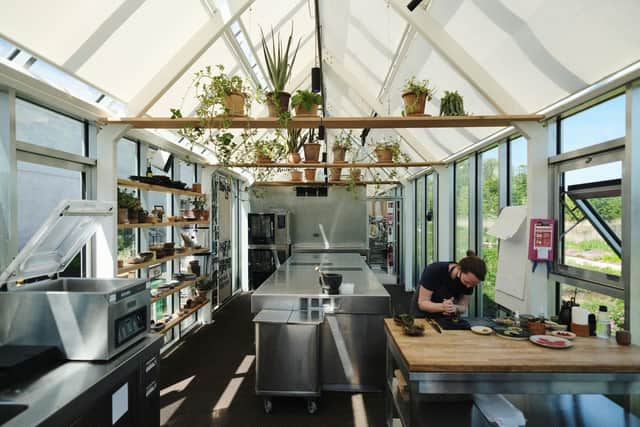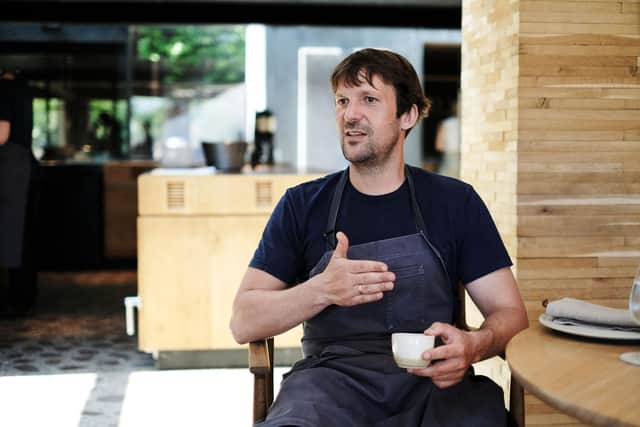Noma closure: Does the restaurant's demise spell the end of fine dining? Scottish chefs have their say
After posting about Noma’s closure on his socials, chef Rene Redzepi spoke to the New York Times about the decision, and acknowledged that the long, gruelling hours at Noma plus the need to pay workers fairly, were not workable. He said: “We have to completely rethink the industry. This is simply too hard, and we have to work in a different way."
So what does this mean for fine dining restaurants, especially those in Scotland?
Advertisement
Hide AdAdvertisement
Hide Ad“I think Scotland’s fine dining scene is healthier than ever”, said Andy Fyfe, of Orrin in Elgin. “Unique, experiential restaurants like Noma have a timeline on them (due to their nature). These guys are the superstars of the culinary world, so what they’re doing is beyond most – they’re voted the best in the world for a reason. But the fine dining model is not broken. People will always want to feel special, and there are restaurants that can do that.”


Stevie McLaughlin, head chef of Scotland’s only two Michelin star restaurant, Restaurant Andrew Fairlie – recently named best restaurant in the UK – agrees that fine dining is alive and well in Scotland and people have an appetite for great food and service. He said: “Fine dining doesn’t have to be starched pink tablecloths and a snooty waiter. It can be focused on great cooking, with passionate, enthusiastic, knowledgeable service, without the starch – and you can see this in abundance in the best of Scottish restaurants."
Tomás Gormley, joint chef patron at Heron in Leith, thinks the closure is down to Noma’s model, not fine dining as a whole. He said: “The fine dining model Noma opened with and developed hasn't been sustainable for a long time. It arguably never was, once you remove unpaid stagiaires from the picture.”
Pam Brunton of Inver on the shores of Loch Fyne spent a short time working at Noma with her partner Rob, and explained their experience of being “stagiaires” – interns. She said: “Rob and I were stagiaires at the original Noma for one month 11 years ago. Both of us loved the experience. Rob was the sole stagiaire in the dining room. There was no better way to get this experience. I was part of a bigger team of stagiaires in the kitchen and found the whole time fascinating and enjoyable; I moved around different sections of the kitchen, learnt a lot and met great people. I gained more than a wage would have given me and value the experience higher than any pay.”
But Brunton realises that this unpaid work is prohibitive for some people, adding: “The experience of staging at restaurants like Noma as exclusive as eating there.”


While Inver has been lauded as a fine dining establishment, Brunton disagrees. She said: “The unsustainable character of some versions of ‘fine dining’ restaurants is something I’m very conscious of. Since opening Inver in 2015, we’ve spent the last few years building an alternative. We don’t call Inver a ‘fine dining’ restaurant (though I appreciate many guests recognise it as one). I call us a craft kitchen – we use traditional cooking skills and contemporary kitchen technique to create a very personal, imaginative cuisine which respects the landscape around us and all the people who contribute to the experience.”
It’s no secret that hospitality is currently being battered by the cost of living crisis, rising energy costs, lack of staff due to Brexit and Covid and rising prices for supplies. How are they adapting to these changes, as well as striving to be sustainable? Fyfe and his business partner, are looking into using solar power to reduce costs, while priding themselves on offering a place for young chefs in the area to start their career. Fyfe is immensely proud that two of his chefs have gone on to work at Restaurant Andrew Fairlie and The Kitchin.
Staff and fair payment were mentioned when Noma closing was discussed. Fyfe said: “For the first time ever, people in the hospitality industry are getting paid fairly and for what they are worth.”
Advertisement
Hide AdAdvertisement
Hide AdIt’s this treatment, and fair payment of staff, that chefs agree on, with Stuart Ralston of Aizle saying: “We must improve the working life for hospitality workers. We will continue to put more into labour costs, continue to make better working conditions for our staff, continue to limit shifts and weekly hours, show our staff their growth within our group, that’s the only way you will retain staff.”
One thing is clear, our hospitality industry will continue to diversify and rise to challenges, so it’s not all doom and gloom. Gormley thinks hard work and creativity is key to survival, saying “Despite the UK Government's failure to acknowledge how their policy failures on the economy and immigration are destroying our industry, hospitality is full of hard-working, creative people who thrive in the face of adversity. Perhaps these challenges will force positive change into the sector.”
Michelin also has a part to play, said Brunton: “Our ‘green Michelin star’ is nice, the recognition is appreciated, but it does raise the question: In this day and age, when issues of environment, climate and human wellbeing are so pressing, why don’t the criteria of the ‘green’ star apply to all of Michelin’s stars; a baseline before any other achievement can be considered?”
Comments
Want to join the conversation? Please or to comment on this article.